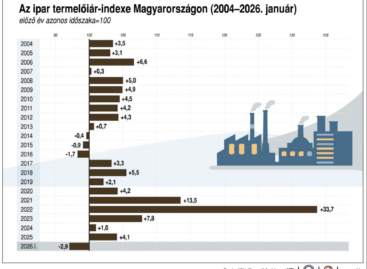Food prices may continue to rise due to price adjustments following inflation
This spring, a number of companies were confronted for the first time with the phenomenon of inflation-tracking price adjustments, which, although they existed before, have now become really perceptible and decisive – writes the G7. In particular, telecommunications service providers came into focus when they generally increased their fees by 15 percent in 2024, referring to the 17.6 percent (annual average) price increase of the previous year measured by the KSH. However, the question arises whether if all companies followed this practice, it would not lead to the same level of price jump as in the last two years.
It seems logical for a company to track inflation, but it raises a number of questions. Didn’t the service providers plan for the year 2023 in such a way that they took into account the expected economic processes? Did everyone miscalculate, or was the level of the increase in price unforeseen, and now an additional correction will take place? If all companies consistently implement a 15 percent increase, doesn’t that jeopardize the 4-5 percent inflation expectation this year?
In 2024, this topic became particularly relevant, as the annual inflation rate was exceptionally high compared to previous years. It is therefore worthwhile to examine and explain the phenomenon from two different perspectives. In a typical competitive market approach, for example, employers often raise workers’ wages at the beginning of the year in order to prevent them from losing purchasing power. In this case, the employees bear the inflation risk during the year, but the employer corrects this at the beginning of the following year.
On the other hand, expenditures related to the state budget, such as pension increases, are usually determined in terms of the expected inflation, not the last year’s inflation. If it turns out at the end of the year that this was insufficient, a subsequent correction is made. The fundamental difference between the two approaches is that one is regulated by market conditions and the other by legislation.
Related news
KSH: The volume of exports of food, beverages and tobacco decreased by 5.7 percent, while imports decreased by 13 percent
🎧 Hallgasd a cikket: Lejátszás Szünet Folytatás Leállítás Nyelv: Auto…
Read more >KSH: in January, the number of guests increased by 5.3 percent and guest nights by 3.6 percent compared to a year earlier
🎧 Hallgasd a cikket: Lejátszás Szünet Folytatás Leállítás Nyelv: Auto…
Read more >Related news
How does the forint exchange rate affect consumer prices?
🎧 Hallgasd a cikket: Lejátszás Szünet Folytatás Leállítás Nyelv: Auto…
Read more >HELL CITY has arrived, led by Michele Morrone
🎧 Hallgasd a cikket: Lejátszás Szünet Folytatás Leállítás Nyelv: Auto…
Read more >









